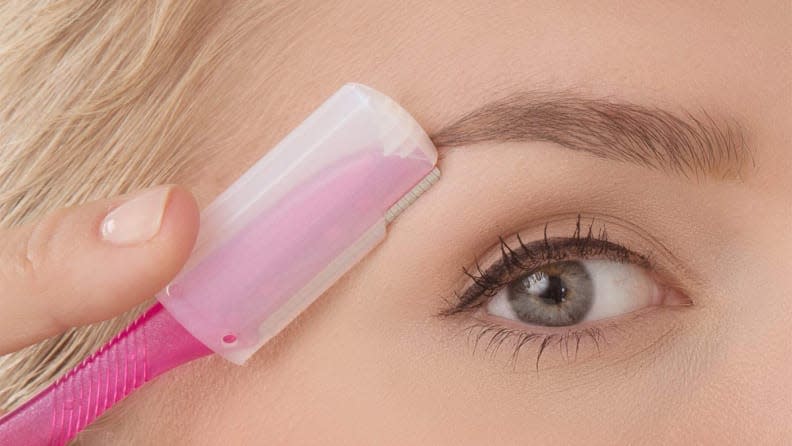I started noticing a major celebrity trend so I set out to learn more
I started noticing a bit of trend recently: Famous faces including Kylie Jenner, Rihanna and Grimes were making headlines for seemingly doing what society tends to look down on average people for doing: Having kids outside of marriage.
I was curious what experts had to say about this, and turns out this latest celebrity headline-making behavior has bigger implications than you may realize.
Experts told me it helps to normalize nontraditional family dynamics, which are slowly becoming more visible in the United States.
Sarah Wright, a licensed independent clinical social worker, says she's observed marriage and parenthood diverging more and more in the U.S., a trend that took hold decades earlier in some European countries thanks to the benefits offered to new parents abroad.
"Society has changed to where we can see role models, celebrities and other people who seem to be doing these two things (getting married and having kids) independent of each other," Wright says. "That tells us that parenthood and marriage are really two different things."
This comes at a time when other types of families are also becoming more visible. thanks in part to social media, which has helped showcase dynamics such as platonic life partnerships and throuples.
There's a whole list of different ways families can look, explains Melissa Dowd, a licensed marriage and family therapist with virtual mental health platform PlushCare. She points to polyamorous couples, same-sex couples and single people who adopt or conceive on their own or via surrogate – like Andy Cohen did in 2019 to welcome his baby boy.
"Seeing celebrities veer outside of the more traditional family structures has definitely brought visibility to, and normalized, family dynamics that were once seen as unconventional," Dowd says. "It has shed such a positive light on the true meaning of family and what it should be about: love, support and a community of people who show up for one another, no matter how they came together in the first place."
Interested in reading more? Click here.
'Dermaplaning': Why people are talking about women shaving their faces
Men aren't the only ones shaving their faces. Now, women are too, explains my colleague Jenna Ryu. And they're openly sharing their experiences with dermaplaning, which involves shaving the tiny, soft hairs on your face for an instantaneous youthful glow.
Mona Gohara, a dermatologist and associate clinical professor of dermatology at Yale University, is glad to see the practice has become a talker in recent years, especially on social media. The hashtag #dermaplaning, how has over 1.8 billion views on TikTok.
"As a Middle Eastern woman, I constantly have hair on my face. So to be able to exfoliate and remove those hairs is a big cosmetic benefit," she says.
Typically, a dermatologist or licensed esthetician will use a surgical-grade scalpel to scrape off vellus hair (also known as "peach fuzz") and a top layer of dead skin cells. But experts say you can also do it from home with an exfoliation tool.
"It's different from a regular razor, because you can get a better angle with the long dermaplaning tools and it's also less sharp than razors, which are meant to cut thick hairs," Gohara explains.
For those interested in trying dermaplaning, click here to read more about what you need to know about the trendy procedure, including its benefits and risks.

'Am I wrong for telling my boyfriend he should watch what he eats?'
In our latest advice column, a reader wrote in: "My boyfriend and I have been dating for six months, but we were close friends for a year before getting together. He constantly talks about how he’s worried about his health considering his genes (his family has a history of diabetes) and how multiple times a month, he passes kidney stones. I’d also like to note that he’s considered very overweight based on his BMI. Because of this, he says he tries to eat healthy. However, I’ve noticed that this isn’t necessarily true.
He usually makes food in large amounts just for him... I’ve tried to ignore it as it’s not my place to say anything. That changed when he was making us some ramen, and he added an additional tablespoon of salt to something already so high in sodium. I decided that I had to say something because I was getting worried for him.
One day while we were watching TV, I asked if I could talk to him about something, and I brought up that I think he should watch how he eats because I’m worried about his heath. He went on about how it’s not that unhealthy, and I shouldn’t be worried because it’s not “that much food." He said I just don’t understand his eating habits and that they are completely healthy. He also said I’m just exaggerating the situation, and I was out of line for making a comment about his weight. I dropped the conversation. It’s been about a month and haven’t talked about it again, but he hasn’t seemed to change how he eats. Am I wrong here?"
In response, our advice columnist offered some feedback. Read her response here.
Today's reads
Have you been thinking about foreplay all wrong? Here's what you may be missing.
Are hair masks really worth it? We asked experts what you need to know.
Ouch! Back pain? You're not alone. In this week's column, our medical contributor Dr. Michael Daignault wrote about an issue many of us are all too familiar with: Lower back pain.
In case you missed this one: Celebrities often deny, keep quiet about their plastic surgery. Here's why that's problematic.
One in 4 Americans are disabled. Disability may not be what you think.
When talking to kids about nuclear weapons, parents and experts suggest truth

Today's pet
Meet Sesame and Cranberry.

"Here is my baby Sesame playing with her wand toy and her sister Cranberry wanting to join in the fun," writes Sarah Lyons.
This article originally appeared on USA TODAY: Parents are often shamed for this, but this trend may help end stigma

